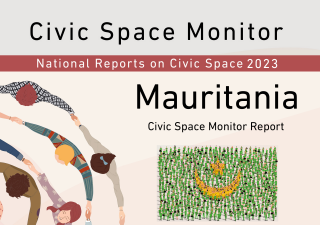
Mauritania: Civic Space Monitor Report
First: The Political Scene and its Repercussions
The most recent nationwide development took place during the May 13 elections for Parliament (the National Assembly), in which a total of 178 deputies were elected, the majority of whom hail from the ruling party, with the opposition winning a total collective of 19 seats, distributed among various factions. The sudden election results propelled a whirlwind of criticism and doubts, which represented, according to opposition parties, a return to fraud, intimidation, and a misuse of political money. It is still too early to assess the effects of these elections, particularly since the radical opposition is still exerting pressure in an attempt to force re-election in the capital, Nouakchott, and in several constituencies which witnessed – as evidence – the occurrence of significant and undisputable irregularities that one would be hard pressed to remain silent about.
The truth is that these elections, with their heightened media momentum, overshadowed other events, including conflicts of a local nature, such as disputes and sensitivities that already exist between tribes or even within the same tribe, geopolitical conflicts that transcend international borders, impacted by neighbouring countries, and, most importantly, issues relating to people’s daily lives, i.e., the living conditions of citizens preoccupied with making a living instead of deciding on matters that do not benefit their health, wellbeing, education, employment, and livelihood.

